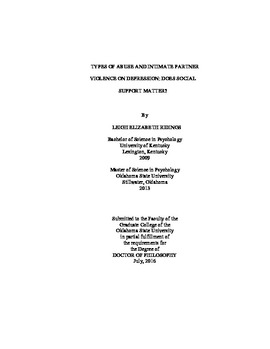| dc.description.abstract | Intimate partner violence (IPV) is a public health concern causing negative impacts across gender, socioeconomic strata, cultures, and ethnicities. The relation between IPV and negative mental health outcomes has been established, with more recent research examining the impact of various manifestations of IPV (e.g., abuse type and chronicity) on individual functioning. Protective factors, such as social support, have been identified that attenuate the increased risk for depression. Less is known about the interrelations between social support, depression, and abuse type (physical, psychological, sexual). While IPV is traditionally examined either from the victim or initiator role, it is also important to consider relationships in which both partners experience and demonstrate violence. Using a sample of caregivers at high-risk for experiencing adverse events, the current study examined the relation between IPV chronicity and severity by type (physical, psychological, and sexual) and depression among caregivers reporting unidirectional (reporting IPV victimization only) versus bidirectional (reporting victimization and initiation of IPV) violence. The impact of social support on depression levels among those reporting unidirectional versus bidirectional physical IPV was also assessed. Results suggest that the majority of the sample (44%) reported bidirectional IPV as compared to victimization only (11%), initiation only (7%) or no IPV (38%), and that this difference was statistically significant. Regarding the impact of abuse type on depression, results indicate that among those reporting unidirectional or bidirectional IPV, abuse variables were not significantly associated with depression. Further, the interactions between social support and abuse variables on depression were not statistically significant. However, those reporting more social support reported significantly lower depression levels regardless of their report of IPV. Findings suggest that both initiation and victimization of IPV should be assessed among individuals at risk for abuse, as the majority of participants reported bidirectional IPV as compared to IPV initiation or victimization. The importance of social support was also identified in this study. Clinicians should assess for patients' unidirectional and bidirectional IPV, particularly among those with young children at high-risk for experiencing adverse events. Connections to social support should also be a focus for clinicians working with families. | |
